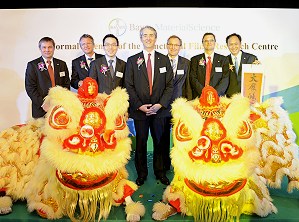BAYER MATERIALSCIENCE
First Asian functional films research centre opened in Singapore / Electronics focus
 Celebrating Bayer´s new Functional Films Research Centre (from left): Christian Haessler and Bernd Steinhilber (heads of Functional Films in the Asia-Pacific and Europe, Middle East, Africa, and Latin America regions), Beh Swan Gin, Patrick Thomas (CEO of Bayer MaterialScience), Joerg Ranau (German ambassador in Singapore), Joachim Wolff (head of Coatings, Adhesives, Specialties) and Marcus Yim (managing director of Bayer South East Asia). |
Bayer MaterialScience (Leverkusen / Germany; www.bayerbms.com) recently opened its first Asian functional films research centre in Singapore, focusing on coated high-tech film and nanotechnology to meet growing demand from the Asia-Pacific electronics market. The centre, built at an initial cost of SGD 12m (EUR 7m) with capability to expand, currently employs around 30 staff. It is BMS’ first such facility in the region and the first outside Germany – a similar centre operates in Leverkusen. It will bundle resources built up by the company in Asia-Pacific, for the most part in Japan, Korea and Taiwan.
In Singapore, the Bayer group company will pursue joint projects with collaboration partners to develop, among other things, functional films that can be applied to flexible screens and three-dimensional displays, as well as nanomaterials like conductive inks used in printed electronics or energy-efficient lighting technologies. BMS is already working on a number of functional film products, based primarily on polycarbonate.
In partnership with German LED specialist Osram (Munich / Germany; www.osram-os.com), BMS has developed a “highly efficient” light extraction film, “Makrofol” TP 228. This is being used in the “Orbeos”, the first OLED surface-emitting panel to be sold on a broad commercial basis as well as a scratch-proof polycarbonate film, Makrofol TP 278, which can be used in 3D surfaces with a deep-gloss finish and is being used in automotive interiors, household appliances and IT equipment. The company’s new Makrofol “Laserprint” monolayer transparent PC film for commercial colour laser printers using dry toner enables the print image to be applied directly to the polycarbonate surface and the digital image to be modified multiple times.
In Singapore, the Bayer group company will pursue joint projects with collaboration partners to develop, among other things, functional films that can be applied to flexible screens and three-dimensional displays, as well as nanomaterials like conductive inks used in printed electronics or energy-efficient lighting technologies. BMS is already working on a number of functional film products, based primarily on polycarbonate.
In partnership with German LED specialist Osram (Munich / Germany; www.osram-os.com), BMS has developed a “highly efficient” light extraction film, “Makrofol” TP 228. This is being used in the “Orbeos”, the first OLED surface-emitting panel to be sold on a broad commercial basis as well as a scratch-proof polycarbonate film, Makrofol TP 278, which can be used in 3D surfaces with a deep-gloss finish and is being used in automotive interiors, household appliances and IT equipment. The company’s new Makrofol “Laserprint” monolayer transparent PC film for commercial colour laser printers using dry toner enables the print image to be applied directly to the polycarbonate surface and the digital image to be modified multiple times.
25.06.2010 Plasteurope.com [216614]
Published on 25.06.2010
